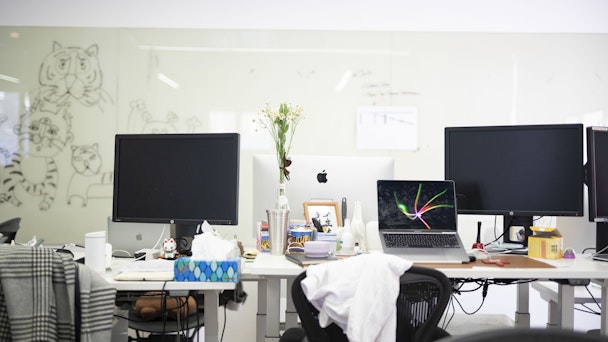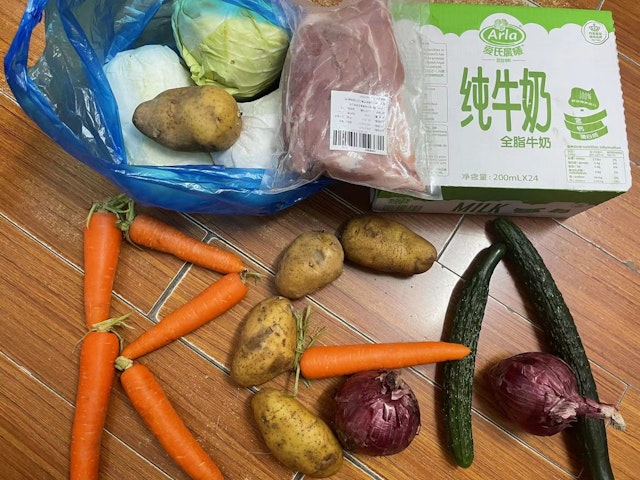As Shanghai eyes an end to Covid restrictions, how have agencies and staff adapted?
Dozens of cites in China, including the major hub of Shanghai, have been under lockdown for weeks on end. We explore the pressures of living and working with the restrictions, and discover how agencies have been supporting staff.

R/GA’s Shanghai offices have been shuttered sine the beginning of lockdown / Annie Gao & R/GA
45 cities across China have been in varying states of Covid lockdown for almost three months. Shanghai, also a major center for the global advertising industry, may be emerging from its lockdown this week but restrictions have been applied unevenly, differing between city districts and even between neighboring residential complexes, and it's unclear whether the whole city will emerge at the same time.
As its stands, residents can go outside for up to three hours a day and some public transport systems are running – though certain portions of the city are still in total lockdown.
With their staff confined to homes and dealing with serious difficulties obtaining basic supplies of food or medicine – e-commerce deliveries have been rendered all but impossible, given the disruption to supply chains – and the additional pressure on their mental and physical health, international agencies operating in the affected areas have been working to provide assistance.
Care packages
Sook Ping Chow, vice-president and managing director at R/GA Shanghai, tells The Drum that ”we’ve been looking at many ways that we can support not just each other at the agency, but also the wider creative community through the lockdown period. For example, with great effort and partnership with a few other agencies, we have managed to work out care packages for all Shanghai-based staff.”
Those care packages, assembled in partnership with other agencies in the city, include fresh food and ingredients, which have been hard to get hold of during the limited windows allowed for shopping. A spokesperson for Publicis Groupe China told The Drum it has delivered more than 1,900 care packages to employees since April alone. ”We were and continue to be in constant contact with our employees to ensure they are provided with any emergency supplies,” they said in an email.
The company’s aid hasn’t been limited to its own staff; since late April, it has partnered with a local medical welfare charity to donate PPE and disinfection materials to 12,000 residents in the city. It’s also made food donations to 640 residents of nursing and care homes, while many Publicis staff in Shanghai have begun volunteering to help bring supplies in to their local communities.
”Despite the adversity, humanity prevails through empathy, compassion and care shown amongst neighbors, strangers and volunteers alike,” says Chow. ”Our team is staying optimistic and believe we will pull through this together. And our commitment to our craft and work has never slowed down. In fact it has often intensified as we need to have contingency plans on campaign and product launches in lockdown situations.”

There’s also the issue of mental health support. ”The mental health part of working in lockdown has been even more visible,” says Liting Spalding, head of audience planning and programmatic at Havas Media Group. After moving to China after the UK's own initial lockdowns subsided, she’s now locked-down in Shanghai.
”Mental health awareness in China is less than what we have in the UK... there’s a lot of what I’d call workaholism. There was already a working culture of staying late, of working overtime; without the office space and the commute, people’s working hours have become much, much longer,” she says. ”On top of that, there’s a lot of pressure from clients – they want us to keep working too.”
Several agencies ramped up their mental health provisions for staff during the pandemic and those operating in China have laid on further measures for their employees. R/GA, for example, set up 24/7 hotline for staff in need of emotional support, while account director Edie Zhang has been leading weekly workouts on Zoom. Publicis Groupe China provided remote counseling services, and provides round-the-clock support for younger staff living alone, a spokesperson told The Drum.
Julian Pullan, vice-chairman, president international of Jack Morton, tells The Drum that, “with any lockdown, like the ones recently experienced in China, the two guiding principles are to keep staff informed and engaged. Overcommunicating is critical – via staff meetings, daily virtual team calls, one-to-ones with managers.
”It’s also important to keep people engaged socially. We created virtual experiences to keep people connected. We also made sure to incorporate physical elements, like sending goody bags to people’s homes with snacks, drinks, etc. It’s also important to give people access to tools that can support their mental wellbeing, like free subscriptions to meditation apps such as Headspace, encouraging shorter meetings and booking ‘quiet me time’ to get people off screens.”
Client activity
Inevitably, the lockdown has begun to affect agency business. Major sporting events, including the Asian Games and top athletics competitions have been canceled, while the ATP's Zuhai Open may yet be postponed.
Those would have been major opportunities for international and domestic advertisers to set out their stalls to consumers in the country, which is among the largest client markets for almost every agency operating in Asia Pacific.
According to Michel de Rijk, Asia chief executive officer of Media.Monks, experiential activity has been quiet, though clients are embracing virtual activations as they did in the first lockdowns of 2020 in the west.
”A lot of sort of our activations have been put on hold and since clients don't really know when everything is going back, the pivot to virtual events is ongoing. Hopefully, they will end up with more of a hybrid model again,” he says.
There's also indirect effects. China’s economy is in crisis, with real estate and automotive sales on the floor, while the supply chains that power its manufacturing sector are disrupted.
That will in turn hurt the economy of neighboring south-east Asia, discouraging clients from spending too much in the wider region in the short-to-mid term. The issue was mentioned in Publicis, WPP, S4, Dentsu, Omnicom and IPG’s quarterly results as a potential brake on growth.
De Rijk predicts that when restrictions finally ease for good across the city, consumers will rush back to shops. ”When shopping centers open up in China again, [consumers] will be queuing up. It’ll be like revenge spending, and as long as we can be a strategic advisor and partner in that and speak help clients prepare for that moment, there will be opportunities.”
When that moment will come, though, is still mystery, says Michel. ”It’s at a standstill.”

